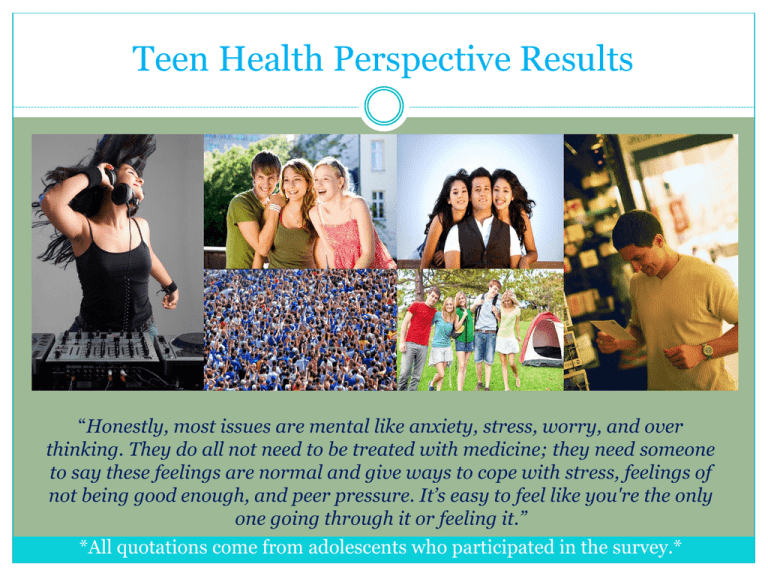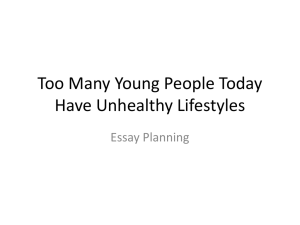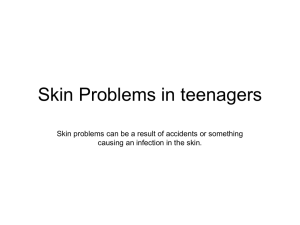
Teen Health Perspective Results
“Honestly, most issues are mental like anxiety, stress, worry, and over
thinking. They do all not need to be treated with medicine; they need someone
to say these feelings are normal and give ways to cope with stress, feelings of
not being good enough, and peer pressure. It’s easy to feel like you're the only
one going through it or feeling it.”
*All quotations come from adolescents who participated in the survey.*
What is Teen Health Perspective?
Teen Health Perspective is a national level survey,
for teenagers ages 13 to 18. Unlike most health
related surveys for teenagers, this survey focuses on
the doctor/patient relationship and how to improve
it by using advice from teens.
Instead of asking if teens partake in risky behaviors,
this survey asks if these behaviors are concerns and if
teens feel comfortable talking to their doctors about
them.
“Have more time alone with doctors.”
Age
Typically, older teenagers were more likely to take
the survey as opposed to younger teenagers, which
was opposite to our original thoughts.
Only 21% of the respondents were either 13 or 14
years old.
This could be plausible because the older teenagers
are about to become adults and are more likely to be
concerned about their healthcare.
“Listen to us.”
Age
“Have doctors communicate in a more "down-to-earth" tone.”
Gender Analysis
A majority of those who
took the survey were
female. (70%)
“Try to have a less awkward environment.”
Location
1
3
1
8
1
3
11
105
1
1
1
1
“Make doctor’s appointments less awkward; ask us things so we don’t have to make the first step.”
Other Demographic Data
Most of our respondents attend public school (82%)
71% of the respondents live in a suburban area.
A majority of those surveyed live with both of their
parents (67%)
“Healthcare issues and concerns should be in the hands of the patients (teenagers) themselves.”
Typically, the dentist
and the pediatrician
ranked high among
those surveyed.
However, other
comments included the
optometrist, neurologist,
and neuropsychologist.
What Type of Providers do
Adolescents See?
“Make things easier for teens to understand.”
Doctor Demographic Data
Most teenagers surveyed go to the doctor once every
few months or once a year (96%)
72% of teenagers visit the same doctor every time
they visit.
The main reason(s) teenagers visit the doctor are a
sports exam (42%), an annual physical (79%), and
treatment for an illness or injury (60%)
However, only 10% of teenagers go to the doctor for
social or emotional health issues.
“I think that it would be useful for our doctors to not assume that all teenagers are doing alcohol, drugs, and sex.”
Doctor Demographic Data
72% of teenagers do not schedule their own
appointments.
Only 12% of teenagers feel that they are not involved
with decisions regarding their health.
“I would like more alone time with my doctor, because there are some topics I do not want to discuss in front of my mom.”
So What Are Teens Biggest Concerns?
“My doctor has never asked me about depression or anxiety issues, which I think could help and prevent a lot of cases if doctors instead of just psychiatrists were open about this issue.”
Worries About the Future
This concern seems to be prevalent among all
teenagers.
27% of teenagers are somewhat concerned, 29% are
concerned, and 25% are extremely concerned.
I thought it would be interesting to see if there was
any correlation between gender and future worries.
“Doctors should be more personal and less robot-like. I feel like I am treated like a number, not a human being.”
While a majority of
those surveyed were
female, female and
transgender adolescents
felt much more worried
about the future as
opposed to males.
Gender and Worries About the
Future
Of those who said that
they were very
concerned about the
future, 70% were
females. All of the
transgender adolescents
stated that they were
very concerned about
the future.
Future worries
Of those who said they
were not concerned
about the future, 60%
were male.
“Treat us with respect.”
Compared to other
issues such as alcohol,
drugs, and sex, the
majority of teens rated
themselves as
“Extremely concerned”
with being healthy in
terms of weight,
exercise, and nutrition
(WEN).
Teens and Healthy Weight, Physical
Activity, and Good Nutrition
Typically, one thinks of
teenagers being
concerned about the
other topics. However,
the percentage of teens
who were somewhat to
very concerned with
(WEN) was 72%
compared to alcohol and
drugs with 19%
“Make sure to cover all areas from sex, drugs, and bullying. A lot of these things teens see daily and are pressured into doing.”
Of all of the topics, teens
felt the most
comfortable talking to
their doctors about
positive aspects of their
lives and healthy weight.
Teens felt least
comfortable talking
about family concerns,
suicidal thoughts or
actions, depression, and
birth control.
Are Teens Comfortable Talking to
Their Doctor About These
Concerns?
“Privacy.”
Where Do Teens Get Answers?
“Handicap accessible accommodations, including assistive technology, and for my doctors and teachers to work together.”
Teens rated their doctors
quite favorably in the
areas of physical health
and nutritional health.
How useful is my doctor?
However, in the areas of
emotional well being
and sexual health,
around 20% of teens felt
that their doctor was not
at all useful.
“Websites generated especially for teens and health.”
Influence
As adolescents, we are constantly influenced among
outside sources.
We included a variety of outside sources to see if one
had a greater influence over another.
The rating scale for influences is 1 to 8. A rating of 1
indicated that it was the most influential.
“Before this survey I didn’t even know depression was something that is normal to talk to your doctor about.”
Influence
The most influential
people in teenagers lives
are parents and friends.
Media and cultural
traditions are the least
influential on a teens
choices.
The parents averages a
score of 2.49, meaning
they were the most
influential overall.
We were surprised to
learn that doctors had a
higher average than
many of the other
options
“More information on health being easily available.”
So What Do Teens Think?
“Teenagers need a place that
they can go where they aren't
surrounded by infants and
toddlers but they aren't
surrounded by grown adults
either. They also need to feel
more comfortable talking to
their doctors but the doctors
have to be more active in
making them feel comfortable.”
“I think it is very important
to have confidence in one's
doctor. I, personally, would
feel better if my doctor
allowed me to speak to him
alone, so I could be able to
express all my concerns”
“They (doctors) need
to understand the
teenager individually
before treating them.”
“Things that govern
teenagers: Time,
Money, Friends.”
“Treat them as your
equal. Not someone's
child. Then you will
gain their respect and
trust.”
33% of teenagers who participated in the survey had additional suggestions for improving healthcare.
“Having a doctor that recognizes the difference between a teenager and a kid or adult socially would be helpful in the communication process.”
What Would Make the Visit Better?
Overall, the results were
varied from this
question.
However, we had some
interesting findings.
Teens didn’t necessarily
want more time with
their doctor, overall they
wanted time alone to
talk to their doctor.
Over 40% of teens said
that it would have a
great effect if the office
space was more inviting
to teenagers and they
were treated like
teenagers.
“Always listen to their problems.”









